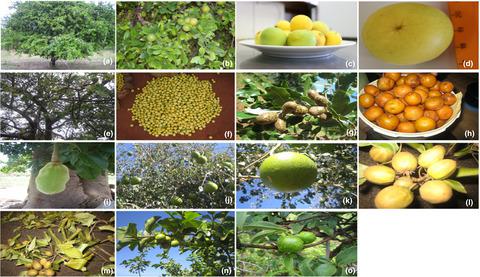当前位置:
X-MOL 学术
›
Food Energy Secur.
›
论文详情
Our official English website, www.x-mol.net, welcomes your
feedback! (Note: you will need to create a separate account there.)
Underutilized African indigenous fruit trees and food–nutrition security: Opportunities, challenges, and prospects
Food and Energy Security ( IF 4.0 ) Pub Date : 2020-06-23 , DOI: 10.1002/fes3.220 Abiodun Olusola Omotayo 1 , Adeyemi Oladapo Aremu 1, 2
Food and Energy Security ( IF 4.0 ) Pub Date : 2020-06-23 , DOI: 10.1002/fes3.220 Abiodun Olusola Omotayo 1 , Adeyemi Oladapo Aremu 1, 2
Affiliation

|
The diverse range of indigenous fruit trees in Africa is a source of untapped potential for food and nutrition security. Here, we review information on 10 indigenous fruit trees that are considered to be underutilized and explore their occurrence, distribution, nutritional components, phytochemicals, and medicinal potentials, as well as their associated challenges and prospects. The indigenous fruit trees, which occur across different ecological zones in Africa, are rich sources of vitamins, minerals, protein, and valuable phytochemicals. They also have recognized medicinal value and used as diverse therapeutic remedies by many ethnic groups in Africa. The key challenges to fruit tree sustainability include indiscriminate and illegal logging, low accessibility, and low acceptability, as well as inadequate research on their cultivation. We proposed a scheme to increase the value chain of underutilized fruit trees, which can contribute to the livelihoods of smallholder farmers and other stakeholders mainly through income generation. In addition to the concerted efforts of multidisciplinary research teams encompassing plant breeders, botanists, molecular biologists, food scientists, and horticulturists, there is an urgent need for governments and other international stakeholders to provide incentives and encourage the domestication, commercialization, and agro‐processing of underutilized fruit trees for future economic prosperity of Africa.
中文翻译:

未充分利用的非洲土著果树和粮食营养安全:机遇,挑战和前景
非洲土著果树种类繁多,为粮食和营养安全提供了尚未开发的潜力。在这里,我们回顾了10种被认为未充分利用的本土果树的信息,并探讨了它们的发生,分布,营养成分,植物化学物质和药用潜力,以及它们相关的挑战和前景。分布在非洲不同生态区的本土果树富含维生素,矿物质,蛋白质和宝贵的植物化学物质。它们还具有药用价值,并被非洲许多种族用作多种治疗手段。果树可持续性的主要挑战包括滥砍滥伐和非法采伐,可及性低,可接受性低以及对种植的研究不足。我们提出了一项计划,以增加未充分利用的果树的价值链,该计划可主要通过创收为小农和其他利益相关者的生计做出贡献。除了包括植物育种家,植物学家,分子生物学家,食品科学家和园艺家在内的多学科研究团队的共同努力之外,迫切需要政府和其他国际利益相关者提供激励措施,并鼓励其驯化,商品化和农业加工未充分利用的果树为非洲未来的经济繁荣做出了贡献。
更新日期:2020-06-23
中文翻译:

未充分利用的非洲土著果树和粮食营养安全:机遇,挑战和前景
非洲土著果树种类繁多,为粮食和营养安全提供了尚未开发的潜力。在这里,我们回顾了10种被认为未充分利用的本土果树的信息,并探讨了它们的发生,分布,营养成分,植物化学物质和药用潜力,以及它们相关的挑战和前景。分布在非洲不同生态区的本土果树富含维生素,矿物质,蛋白质和宝贵的植物化学物质。它们还具有药用价值,并被非洲许多种族用作多种治疗手段。果树可持续性的主要挑战包括滥砍滥伐和非法采伐,可及性低,可接受性低以及对种植的研究不足。我们提出了一项计划,以增加未充分利用的果树的价值链,该计划可主要通过创收为小农和其他利益相关者的生计做出贡献。除了包括植物育种家,植物学家,分子生物学家,食品科学家和园艺家在内的多学科研究团队的共同努力之外,迫切需要政府和其他国际利益相关者提供激励措施,并鼓励其驯化,商品化和农业加工未充分利用的果树为非洲未来的经济繁荣做出了贡献。











































 京公网安备 11010802027423号
京公网安备 11010802027423号